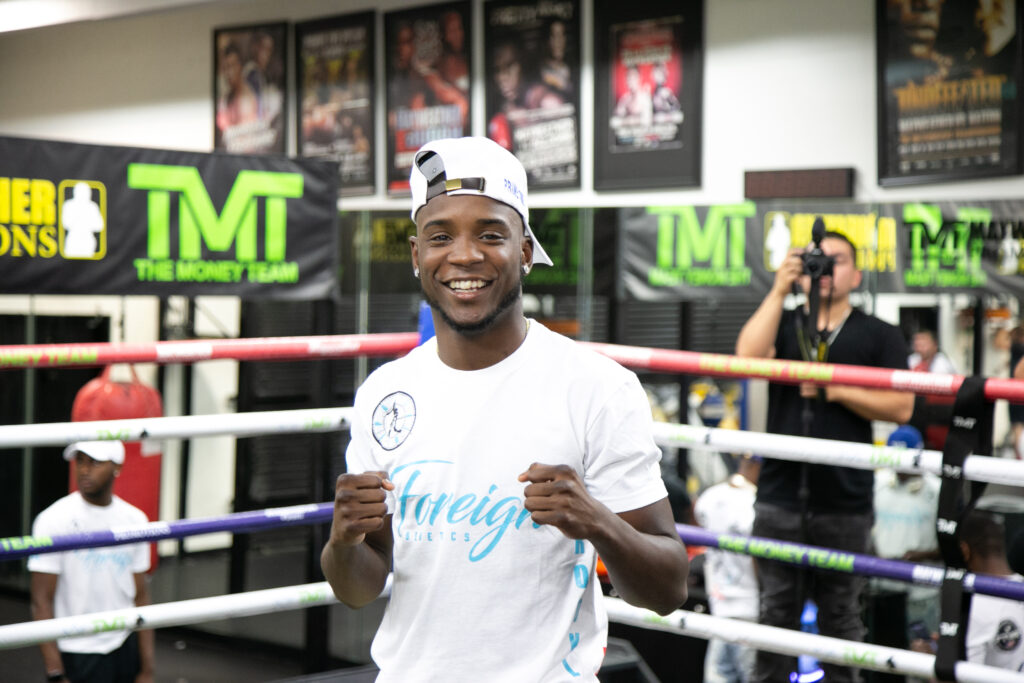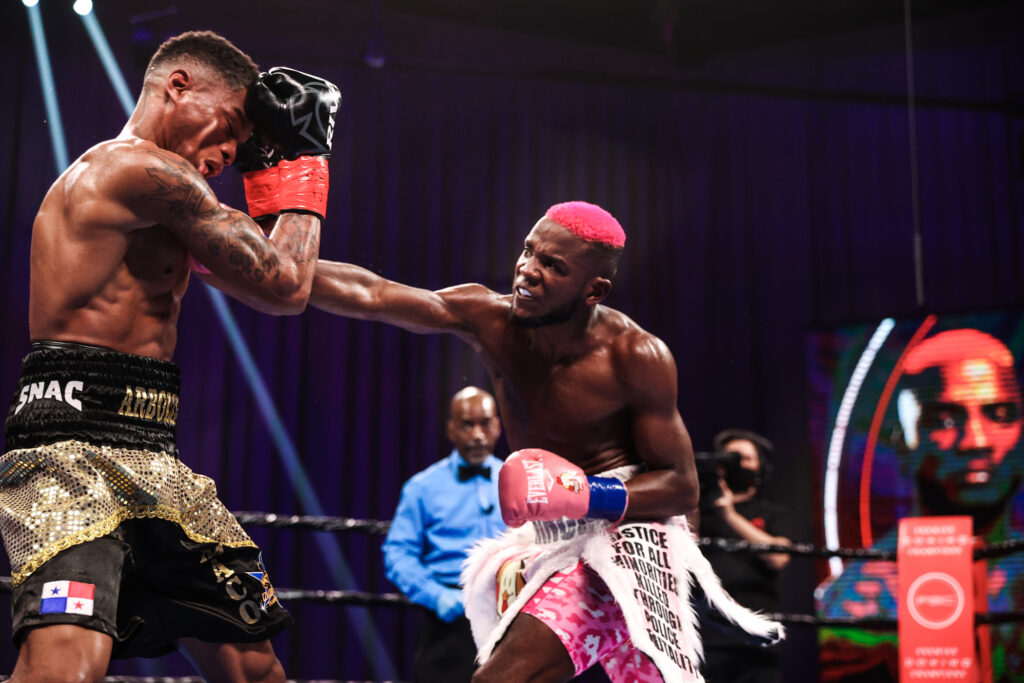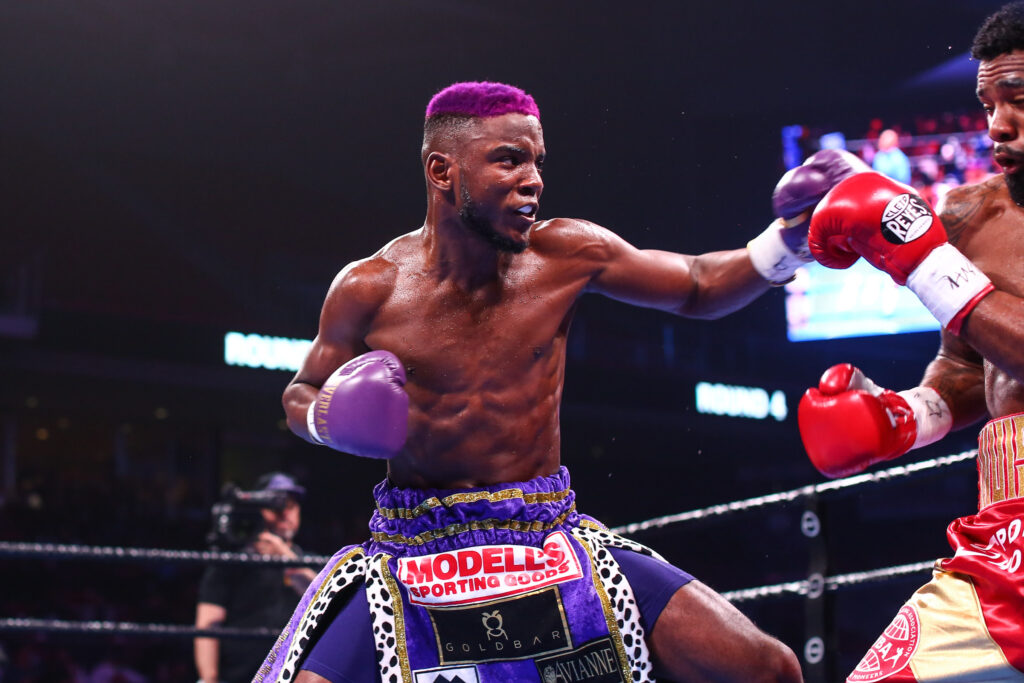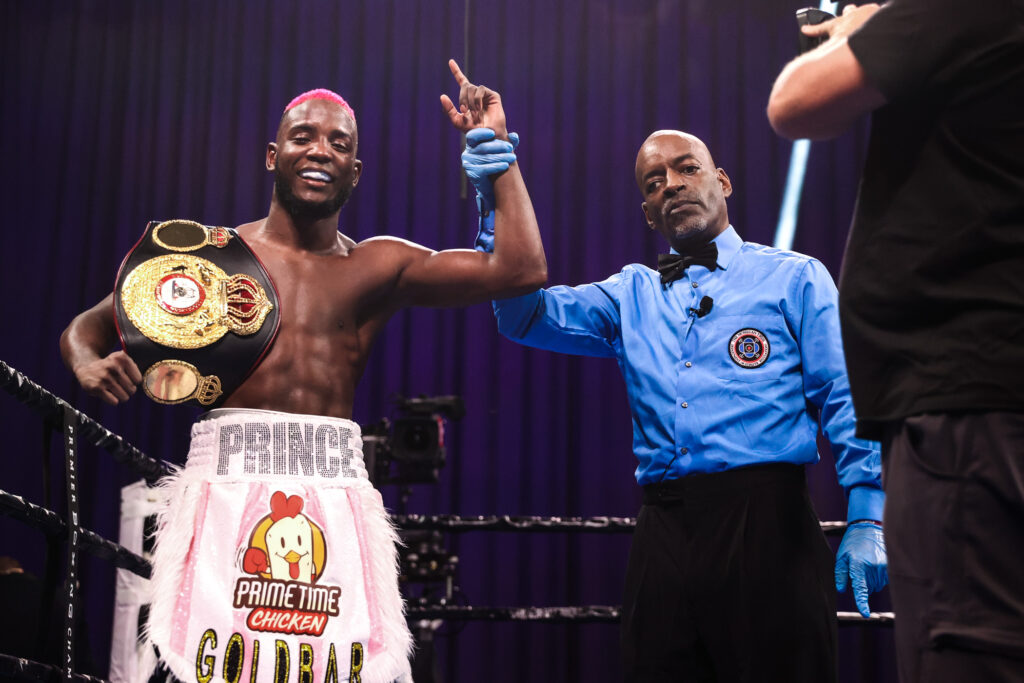“The only thing I was really missing from that ‘star appeal’ was the teeth – but now I got ‘em! They can’t tell me nothing now, I’m red carpet ready!” jokes Brooklyn’s Chris Colbert (15-0, 6KOs), enjoying one of his own effortless transitions from mature, professional fighter to braggadocios entertainer.
The teeth are sparkling, no doubt, but it’s Colbert’s sizable leap from potential star to interim world champion that has caught boxing’s attention.
Speaking to Boxing Social, with his hood up to conceal any potential explosion of colour, the New York-native was keen to explain a tumultuous upbringing whilst holding any sympathy-seeking at arms’ length: “Growing up in Brooklyn, it’s all about what you make it. A lot of people can tell you different things. People can say it’s hard, some people had great lives. For me, it was more of a rollercoaster, but I take blessings from it because it got me to where I am today.
“Going through ups and downs, fighting a lot, getting into a lot of illegal trouble, I had things like that. Being homeless. I never let that bother me; I always had a mission in my head, and I had dreams. I didn’t really know what I wanted to be, but it was my dream to become something – by any means necessary. I didn’t care if I was the best crack dealer in the world: that’s what I was gonna be. When I was 14, God gave me that dream; He told me what that dream was, and I’m here today [in boxing].”

Just two weeks after walking into the boxing gym for the first time (to seemingly regulate what could have been a street fight), the teenage Colbert was entering open-weight amateur tournaments. He spent an entire day racing around the outskirts of Brooklyn, hunting for his first amateur boxing license, knocking on doors, and making calls. And when the time came, he knocked out Angel Ruiz, a 30-0 fighter, on his debut.
“They said, ‘Do you want to fight him?’ I said, ‘I’m here now, so what…’ I beat ‘em. My first fight, the guy was 30-0. I was switching from lefty to righty, using my street fighting stance, using the 52 block on ‘em. He didn’t know what was going on. I went 11-0, but I only fought novice in my second fight, and I stopped him.
“I didn’t even know what I was doing, but I was doing something,” Colbert laughs, reaffirming the belief that his career in boxing was written. “What really helped me was that I was always in people’s conversations. I was always listening to people, so that helped me learn about the game. I was skipping school to go to press conferences, and that helped me, because I learned how to talk at press conferences. That’s not my thing, I’d rather talk directly to someone.
“I went to press conferences for: Zab Judah, Paulie Malignaggi, Adrien Broner, Bernard Hopkins, Tavoris Cloud, Luis Collazo, Curtis Stevens. Anybody who came to the Barclays Centre, I was there. They all know my name for that reason, because I used to tell ‘em: ‘Y’all gon’ see me one day.’ I made that statement from when I was young that I was gonna be the best. The politics [of amateur boxing] just wasn’t for me; I wasn’t gonna waste my time just to get robbed of my spot at the Olympics, so I turned pro. Al Haymon called my phone, so I was like, ‘Oh, gotta go…’
Promoted by Premier Boxing Champions and advised by boxing powerbroker Al Haymon, the unbeaten super-featherweight has finally arrived, after hearing his name whispered – but never proudly yelled from the rooftops – in boxing circles or at those local, national, and international events.
Colbert turned professional back in 2015, despite qualifying for the Rio 2016 Olympic Games, but his introduction to the paid ranks wasn’t as smooth as he’d initially hoped: “On my pro debut, my Mom was in a shelter; I was sleeping on chairs just two nights before my professional debut. This is real life stuff to me, but I don’t speak about it because I don’t look for sympathy. At the end of the day, we all have a story. That’s what helps you become you are.
“A lot of these fighters come with these sad stories just to make them sound like sad stories, when really they had food on their plates; they had homes to live in; they had clothes on their backs. They make these sad stories sound real so that people in boxing feel sympathy for them. But this is real life shit to me. I used to fight every day; I used to fight for no reason. I think I had ‘short, angry, black man syndrome.’ You never heard of that, right? I made a new one for y’all!”

Again, a glimpse of humour breaks from the bleak reality of discussing his early childhood. Colbert is the sixth of 10 children, five girls and five boys. He was the only one of his siblings to answer the calls of the Brooklyn streets and, as a result, explains he never really had a relationship with his brother or sisters. They were “homebodies,’ he tells Boxing Social, whilst he took care of himself, bending the black and white of the law.
Colbert had first rose to prominence after starring in Jay Bulger’s Netflix documentary, ‘Counterpunch.’ Foul-mouthed and somewhat lost in adolescence after six professional fights, he revealed that he had watched it back just a few months ago and was taken aback at his own mannerisms. The documentary helped him carve out a fanbase worldwide, starring alongside former world champion Peter Quillin and reputable USA amateur Cam F Awesome, but it has taken years for him to earn his own airtime.
“They still don’t respect me,” explained the interim WBA world champion. “I’m not in this game to build up respect. I’m in this game to let my name hang up in the banners of the Barclays Centre. I’m gonna do what I’m gonna do at the end of the day, no matter what happens, I’m gonna put my all into every fight. I love [having a chip on my shoulder], I love having something to prove. But you’ll never prove them wrong 100%; there will always be somebody with something to say. They’ still gon’ see me.
“Right now, at the top, it’s me and Shakur Stevenson, skill-wise. There are levels to this boxing game; I’m a dog, and I’m gonna win by any means necessary. He’s a great fighter and I really don’t take nothing away from him, I’m no hater. He’s doing his thing. But when it’s time for us to fight, it’s business and I gotta do what I gotta do. We had our little moments when we didn’t get along [in the amateurs], but we gotta put that all behind us because we’re grown men now. That’s the problem in America, we don’t stick together. I support all of the young fighters who came up in my generation, I’m gonna support you all until we have to fight.”
Colbert, not shy when offering praise to potential rivals, explained: “I wanna be on top and extend my hand down; I wanna help some people up. Not everybody can be that man at the top. I’m proud of everybody that came up in my era, but if you have a bad performance, I’m ‘a tell you. I don’t hold my tongue for anybody, but I’m happy to give credit.”
It’s credit that the Brooklyn-man has mostly been receiving, notably stealing headlines in picking up the NABA USA lightweight title with a stunning first round stoppage of Miguel Beltran in September 2019. Since that explosive performance, he has added a unanimous decision victory over former world champion, Jezreel Corrales for the interim WBA super-featherweight strap and an 11th round stoppage of Jaime Arboleda in his first defence.
It seems that massive nights are looming large. Colbert spoke of Stevenson but was also keen to emphasise plans to climb boxing’s blossoming 135lb ladder in the future, discussing potential opponents for shinier trinkets with Boxing Social: “This belt, it’s just a little Gucci belt. Now I need to pick up the LV, the Louis [Vuitton] belt, the Birkin bag. I swear, I forget this belt is even in my house. I’m not one of those fighters that carry my belt everywhere – forget about it. I know I can do more than that; I deserve more than that. I’m not tripping on unifying a title, because I don’t know if I’ll be at the weight that long.

“There are massive fights [at lightweight]. I think a year-and-a-half, maybe two. Me and a Teofimo [Lopez] fight would be a devastating match-up for the fans. Oh my god – I can smell it. I worked with him right before the Olympics, it was good, he’s a great fighter. But like I said, I’m a different type of fighter. I’m often imitated, never duplicated, one originated; I’m a different breed. Devin Haney is a great fighter, too. But I just don’t think he could beat Teofimo Lopez. Gervonta Davis, we know he’s a powerhouse.
“Ryan Garcia is just a superstar overall. The way he carries himself, he’s gonna be a superstar no matter what happens in his career. He’s gonna be the next Oscar De La Hoya – even better. He was my boy, we were close. I was sparring with him the day before Al Haymon called me. He showed a lot of grit [when beating Luke Campbell], a lot of hunger and a lot of heart. He still has some things to work on in terms of his skills, but he’s gonna be on top for a while.”
Still only 24, Colbert tiptoes the fine line between confidence and arrogance perilously but seems difficult – almost impossible – to dislike. He spent days in the nosebleeds, watching controversial fighters like Adrien Broner take to the microphone, skipping out on school to focus on life lessons. But he has remained humble and aware of crossing the often-invisible line.
He frequently throws in one-liners; whether it’s dismissing his ‘Lil B-Hop’ nickname because Hopkins is “too ugly”, or boasting that he’s known as ‘Prime Time’ because he’s made for the bright lights of Brooklyn’s Barclays Centre. He always has something to say – and it’s always worth hearing. It is refreshing to hear him capture attention with his words, as opposed to his brash, extreme hairstyles. But even then, he was able to prove Boxing Social wrong. It seems to be a theme and Chris Colbert seems to have it all.

“A lot of people think I do that for swag or for style, but there ain’t no swag in colouring your hair. The last fight, I died my hair pink, that was for breast cancer. I know a lot of people suffering; my son’s grandmother, she’s fighting like a soldier. Some people I know that have beaten breast cancer, so it’s for those people. And everybody else struggling with it, too. I dye my hair for a cause. I dye my hair that colour for awareness and I pick specific people, to give them a shout out on TV and to let them know that I’m fighting with them.”
Feature image: Premier Boxing Champions/Stephanie Trapp
